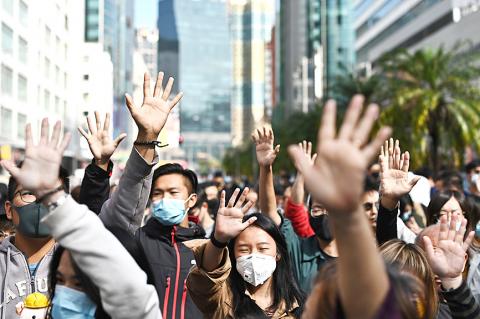Hong Kong police yesterday ended their blockade of the Hong Kong Polytechnic University campus after surrounding it for 12 days to try to arrest pro-democracy protesters holed up inside.
Police removed a stash of nearly 4,000 gasoline bombs left behind by protesters, who fought pitched battles about two weeks ago with riot officers on surrounding streets.
About 100 officers first entered the campus on Thursday to collect materials and remove dangerous items.

Photo: AFP
A police statement said that over two days, they seized 3,989 gasoline bombs, 1,339 explosive items, 601 bottles of corrosive liquids and 573 weapons.
No protesters were found.
One masked man told reporters that the night before police entered the campus about 20 people were still hiding to avoid arrest.
They were the holdouts from perhaps 1,100 people who had retreated inside after the battles with police.
A few escaped the cordon, but police said that they arrested 810 people and recorded the details of 300 minors who could later face charges.
Another 567 people were arrested in the vicinity of the university, police said.
A university official estimated that it would take five to six months to repair the damage to the campus.
During an official visit to Thailand, Hong Kong Chief Executive Carrie Lam (林鄭月娥) said that Hong Kong is undergoing a difficult period, but that the fundamentals of the territory, including its strengths under the “one country, two systems” framework, remain strong.
“I and my government are listening to our people with a view to resolving some deep-seated problems in Hong Kong through dialogue,” she said. “I have every confidence that Hong Kong can bounce back, as we always do.”
Hundreds of people yesterday chanted pro-democracy slogans at lunchtime rallies across Hong Kong. Some carried posters featuring US President Donald Trump. Other posters told Lam that “it’s time to step down.”
The latest protests followed a large rally on Thursday night to thank the US — on the country’s Thanksgiving Day holiday — after Trump signed into law legislation supporting the protesters.
Chanting: “Fight for freedom, stand with Hong Kong,” thousands of people waved US flags and urged other countries to join the US in supporting human rights in Hong Kong.

INVESTIGATION: The case is the latest instance of a DPP figure being implicated in an espionage network accused of allegedly leaking information to Chinese intelligence Democratic Progressive Party (DPP) member Ho Jen-chieh (何仁傑) was detained and held incommunicado yesterday on suspicion of spying for China during his tenure as assistant to then-minister of foreign affairs Joseph Wu (吳釗燮). The Taipei District Prosecutors’ Office said Ho was implicated during its investigation into alleged spying activities by former Presidential Office consultant Wu Shang-yu (吳尚雨). Prosecutors said there is reason to believe Ho breached the National Security Act (國家安全法) by leaking classified Ministry of Foreign Affairs information to Chinese intelligence. Following interrogation, prosecutors petitioned the Taipei District Court to detain Ho, citing concerns over potential collusion or tampering of evidence. The

Seventy percent of middle and elementary schools now conduct English classes entirely in English, the Ministry of Education said, as it encourages schools nationwide to adopt this practice Minister of Education (MOE) Cheng Ying-yao (鄭英耀) is scheduled to present a report on the government’s bilingual education policy to the Legislative Yuan’s Education and Culture Committee today. The report would outline strategies aimed at expanding access to education, reducing regional disparities and improving talent cultivation. Implementation of bilingual education policies has varied across local governments, occasionally drawing public criticism. For example, some schools have required teachers of non-English subjects to pass English proficiency

‘FORM OF PROTEST’: The German Institute Taipei said it was ‘shocked’ to see Nazi symbolism used in connection with political aims as it condemned the incident Sung Chien-liang (宋建樑), who led efforts to recall Democratic Progressive Party (DPP) Legislator Lee Kun-cheng (李坤城), was released on bail of NT$80,000 yesterday amid an outcry over a Nazi armband he wore to questioning the night before. Sung arrived at the New Taipei City District Prosecutors’ Office for questioning in a recall petition forgery case on Tuesday night wearing a red armband bearing a swastika, carrying a copy of Adolf Hitler’s Mein Kampf and giving a Nazi salute. Sung left the building at 1:15am without the armband and apparently covering the book with a coat. This is a serious international scandal and Chinese

NEGOTIATIONS: The US response to the countermeasures and plans Taiwan presented has been positive, including boosting procurement and investment, the president said Taiwan is included in the first group for trade negotiations with the US, President William Lai (賴清德) said yesterday, as he seeks to shield Taiwanese exporters from a 32 percent tariff. In Washington, US Trade Representative Jamieson Greer said in an interview on Fox News on Thursday that he would speak to his Taiwanese and Israeli counterparts yesterday about tariffs after holding a long discussion with the Vietnamese earlier. US President Donald Trump on Wednesday postponed punishing levies on multiple trade partners, including Taiwan, for three months after trillions of US dollars were wiped off global markets. He has maintained a 10 percent